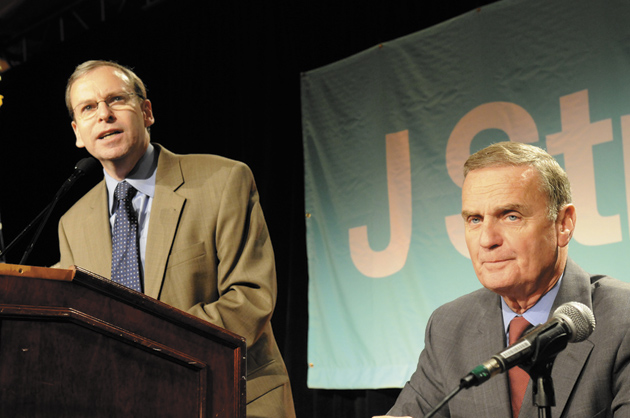To those who have been supporters both of the state of Israel and of stronger efforts to make peace with the Palestinians, the recent conference organized by the organization called J Street was a fantasy come true. J Street is a nonprofit group founded in April 2008 by, among others, its current executive director, Jeremy Ben-Ami, a Democratic policy adviser in the Clinton administration who has had much experience in public relations. He called it J Street partly as a play on the K Street lobbyists and partly because there is no J Street in Washington and he wanted to suggest that the new organization was filling a gap. Everything about the J Street conference, “Driving Change, Securing Peace,” that was held in Washington, D.C., in the last week of October was far larger than most expected.
While in the past a gathering of mostly Jewish advocates of a two-state solution of the Israeli–Palestinian conflict might have attracted one or two hundred participants, here there were 1,500. They jammed the rooms at the Grand Hyatt Hotel, in which discussions took place on such subjects as “Human Rights in Israel,” “How Christians, Muslims and Jews Can Work Together for Two States,” and “The View from the Hill: Congress and the US–Israeli Relationship”—to name three of over two dozen sessions.
Formerly, a single member of Congress or one prominent elected official might have attended such an event, but here half a dozen members of Congress gave talks, dozens more attended a reception and banquet, and an “Honorary Host Committee” consisted of 150 members of Congress. General James L. Jones, Obama’s national security adviser, gave the opening speech for the second session of the conference.
Why is J Street apparently achieving what has eluded so many others? One reason is surely that the time is ripe. The gap has kept widening between the spectrum of views held by American Jews, especially those of the younger generation, and the far narrower range of views advocated by those who represent the national Jewish community in Washington, particularly the American Israel Public Affairs Committee (AIPAC), which is widely seen both as influential with legislators and as reflecting the perspective of the Israeli government.
According to exit polls, 77 percent of American Jews voted for President Obama; polling data show that a very wide range of American Jewish opinion supports a two-state solution and vigorous US action to achieve one. This is not the picture that our elected officials have heard from prominent Jewish organizations, and this discrepancy has created an opportunity for J Street.
J Street has also exploited a second opportunity. New technology, just as it enabled Barack Obama to run a new type of presidential campaign in 2008, has created new opportunities for such a movement. The Internet makes it far quicker and cheaper to find supporters and to keep in touch with them, and it equally makes it far easier for supporters to take action. Many organizations have tried to use e-mail campaigns and Web sites to keep their supporters engaged and to find new ones. But J Street (which can be found at www.jstreet.org) has been one of the more successful.
While J Street has hired some Internet wizards, this can hardly be the full explanation for its success. Another factor must be the frustration felt among many American Jews. As one congressman, visibly impressed by the scale of the J Street event, told me, “The rapid growth of J Street shows how much it was needed.”
Another reason for the success of J Street is that Jeremy Ben-Ami has kept its message simple and inclusive. The security and future of Israel, he made it clear, are at risk if the present situation goes on. Solving this problem, Ben-Ami said in his keynote speech, must be “an urgent priority” for the United States, not “a distant, almost meaningless, aspiration.” To accomplish this, the Jewish majority must find its voice and “change the unconstructive way this issue plays out in American politics and policy.”
But Ben-Ami also built in a key ingredient that was entirely missing in past efforts of the pro-Israel, pro-peace advocates. Like previous efforts, such as Americans for Peace Now, J Street itself is an educational organization. But there is also a J Street political action committee; it endorses and raises money for congressional candidates who support a two-state solution of the Israeli–Palestinian conflict, with security for both peoples.
It may seem astounding that a relatively small amount of money—the J Street PAC raised $600,000 in 2008—can have a big impact on such a thorny issue. But this is the first time that a PAC has been devoted to peace in the Middle East. It has earned huge dividends in energizing the supporters and potential supporters of J Street and raising the profile of the pro-Israel, pro-peace camp on Capitol Hill. Supporters have found new ways to take concrete political actions, and many candidates endorsed by J Street were elected in 2008, among them Senator Jeff Merkley in Oregon and Representatives Tom Perriello in Virginia and Jared Polis in Colorado.*
Advertisement
Representative Bob Filner (D, CA) may have best explained the matter when he said that members of Congress
don’t vote for contributions. But if there is someone who can give you some backbone, that helps. Otherwise people who don’t understand an issue so well will just take the easy way…. For years there was nobody there [advocating for a two-state solution] so we had to vote for all this stuff. Hopefully with J Street, we can be more rational.
One participant said, “J Street is the first Jewish peace organization that really understands what it takes to work within the system…what they need to do to get a seat at the table.” Another said, “J Street put money on the table and members of Congress listened.”
What has been the Israeli response to J Street? Israeli Ambassador to the United States Michael Oren very publicly declined to attend the conference at the Grand Hyatt. But Israeli President Shimon Peres and Tzipi Livni, the Kadima Party chair (and leader of the opposition), sent warm letters of greeting and encouragement, and numerous former Knesset members participated. During the last few weeks, some supporters of Israel’s present government attacked J Street in the press and tried to pressure congressional members of the Honorary Host Committee to withdraw. Five of six Republicans did withdraw (leaving only Representative Charles Boustany of Louisiana, who was given an extremely warm welcome when he was introduced at the conference). But almost all of the nearly 150 Democrats held their ground.
It is probably too late for J Street to be stopped by the sort of demonizing that has sometimes chilled dissent in the past. The group is growing and hiring new staff, and it has just gained a grassroots community-based component by a merger with Brit Tzedek—the Jewish Alliance for Peace and Justice. Brit Tzedek has chapters across the country that often hold events in synagogues; its national religious “Rabbinic Cabinet” has mobilized over a thousand rabbis and cantors who support a “negotiated two-state solution.” The group is complemented by J Street’s assets, including its national political organization, money, and Washington savvy. The rise of J Street gives strong promise that Jews with a more liberal outlook on the Israeli–Palestinian problem will now have a voice in the American political system.
The real question about J Street may be not whether it will grow but whether it is simply too late. Numerous trends, including the spread of Israeli settlements, the increase of the Palestinian population, the rise of Hamas, and growing Orthodox influence in Israel, may be putting a two-state solution out of reach. Asked about this, Ben-Ami said:
It is as if you are driving at night in the fog. You have driven right past a sign that says, “Danger Ahead.” You have no idea when you might suddenly go over a cliff. I fear it may be a sudden painful awareness when we realize it is too late for two states. Those in the Jewish community who are ignoring the warning signs do so at their peril.
—November 5, 2009
This Issue
December 3, 2009
-
*
The full list is published at www.jstreetpac.org/pac/2008-endorsed-candidates. ↩



